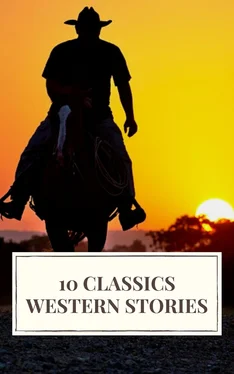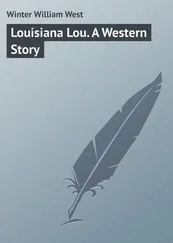“Yes, sir––Susie and Sallie, that was as nice and eddicated girls as you ever see, they jest put on overalls and climbed their horses and worked them cattle themselves. Course they had rodér hands to do the dirty work in the corrals––brandin’ and ear-markin’ and the like––but for ridin’ the range and drivin’ they was as good as the best. Well, sir, you’d think every man in Arizona, when he heard what they was doin’, would do everythin’ in his power to help ’em along, even to runnin’ a Dos S on an orehanna once in a while instead of hoggin’ it himself; but they’s fellers in this world, I’m convinced, that would steal milk from a sick baby!”
The brawny foreman of the Dos S dropped the cat and threw out his hands impressively, and once more the wild glow crept back into his eyes.
“You remember that Jim Swope that I introduced you to down on the desert? Well, he’s a good sheepman, but he’s on the grab for money like a wolf. He’s got it, too––that’s the hell of it.”
Creede sighed, and threw a scrap of bacon to Tommy.
“He keeps a big store down at Moroni,” he continued, “and the widde’, not wantin’ to shove her cows onto a fallin’ market, runs up an account with him––somethin’ like a thousand dollars––givin’ her note for it, of course. It’s about four years ago, now, that she happened to be down in Moroni when court was in session, when she finds out by accident that this same Jim Swope, seein’ that cattle was about to go up, is goin’ to close her out. He’d ’a’ done it, too, like fallin’ off a log, if the old judge hadn’t happened to be in town lookin’ up some lawsuit. When he heard about it he was so durned mad he wrote out a check for a thousand dollars and give it to her; and then, when she told him all her troubles, he up and bought the whole ranch at her own price––it wasn’t much––and shipped her and the girls back to St. Louie.”
Creede brushed the dirt and flour off the table with a greasy rag and dumped the biscuits out of the oven.
“Well,” he said, “there’s where I lost my last chanst to git a girl. Come on and eat.”
From lonely ranches along the Salagua and Verde, from the Sunflower and up the Alamo, from all the sheeped-out and desolate Four Peaks country the cowboys drifted in to Hidden Water for the round-up, driving their extra mounts before them. Beneath the brush ramada of the ranch house they threw off their canvas-covered beds and turned their pack horses out to roll, strapping bells and hobbles on the bad ones, and in a day the deserted valley of Agua Escondida became alive with great preparations. A posse of men on fresh mounts rode out on Bronco Mesa, following with unerring instinct the trail of the Dos S horses, balking their wild breaks for freedom and rushing them headlong into the fenced pasture across the creek. As the hired hands of the Dos S outfit caught up their mounts and endeavored to put the fear of God into their hearts, the mountain boys got out the keg of horseshoes and began to shoe––every man his own blacksmith.
It was rough work, all around, whether blinding and topping off the half-wild ponies or throwing them and tacking cold-wrought “cowboy” shoes to their flint-like feet, and more than one enthusiast came away limping or picking the loose skin from a bruised hand. Yet through it all the dominant note of dare-devil hilarity never failed. The solitude of the ranch, long endured, had left its ugly mark on all of them. They were starved for company and excitement; obsessed by strange ideas which they had evolved out of the tumuli of their past experience and clung to with dogged tenacity; warped with egotism; stubborn, boastful, or silent, as their humor took them, but now all eager to break the shell and mingle in the rush of life.
In this riot of individuals Jefferson Creede, the round-up boss, strode about like a king, untrammelled and unafraid. There was not a ridge or valley in all the Four Peaks country that he did not know, yet it was not for this that he was boss; there was not a virtue or weakness in all that crowd that he was not cognizant of, in the back of his scheming brain. The men that could rope, the men that could ride, the quitters, the blowhards, the rattleheads, the lazy, the crooked, the slow-witted––all were on his map of the country; and as, when he rode the ridges, he memorized each gulch and tree and odd rock, so about camp he tried out his puppets, one by one, to keep his map complete.
As they gathered about the fire that evening it was Bill Lightfoot who engaged his portentous interest. He listened to Bill’s boastful remarks critically, cocking his head to one side and smiling whenever he mentioned his horse.
“Yes, sir,” asserted Bill belligerently, “I mean it––that gray of mine can skin anything in the country, for a hundred yards or a mile. I’ve got money that says so!”
“Aw, bull!” exclaimed Creede scornfully.
“Bull, nothin’,” retorted Lightfoot hotly. “I bet ye––I bet ye a thousand dollars they ain’t a horse in Arizona that can keep out of my dust for a quarter!”
“Well, I know you ain’t got no thousand dollars––ner ten,” sneered Creede. “Why don’t you bet yearlings? If you’d blow some of that hot air through a tube it’d melt rocks, I reckon. But talk cow, man; we can all savvy that!”
“Well, where’s the horse that can beat me?” demanded Lightfoot, bristling.
“That little sorrel out in the pasture,” answered Creede laconically.
“I’ll bet ye!” blustered Lightfoot. “Aw, rats! He ain’t even broke yet!”
“He can run, all right. I’ll go you for a yearling heifer. Put up or shut up.”
And so the race was run. Early in the morning the whole rodéo outfit adjourned to the parada ground out by the pole corrals, the open spot where they work over the cattle. Hardy danced his sorrel up to the line where the gray was waiting, there was a scamper of feet, a streak of dust, and Bill Lightfoot was out one yearling heifer. A howling mob of cowboys pursued them from the scratch, racing each other to the finish, and then in a yell of laughter at Bill Lightfoot they capered up the cañon and spread out over The Rolls––the rodéo had begun.
As the shadow of the great red butte to the west, around which the wagon road toiled for so many weary miles, reached out and touched the valley, they came back in a body, hustling a bunch of cattle along before them. And such cattle! After his year with the Chiricahua outfit in that blessed eastern valley where no sheep as yet had ever strayed Hardy was startled by their appearance. Gaunt, rough, stunted, with sharp hips and hollow flanks and bellies swollen from eating the unprofitable browse of cactus and bitter shrubs, they nevertheless sprinted along on their wiry legs like mountain bucks; and a peculiar wild, haggard stare, stamped upon the faces of the old cows, showed its replica even in the twos and yearlings. Yet he forbore to ask Creede the question which arose involuntarily to his lips, for he knew the inevitable answer.
Day after day, as they hurriedly combed The Rolls for what few cattle remained on the lower range, the cowmen turned their eyes to the river and to the cañons and towering cliffs beyond, for the sheep; until at last as they sat by the evening fire Creede pointed silently to the lambent flame of a camp fire, glowing like a torch against the southern sky.
“There’s your friends, Rufe,” he said, and the cowmen glanced at Hardy inquiringly.
“I might as well tell you fellers,” Creede continued, “that one reason Rufe come up here was to see if he couldn’t do somethin’ with these sheepmen.”
Читать дальше












